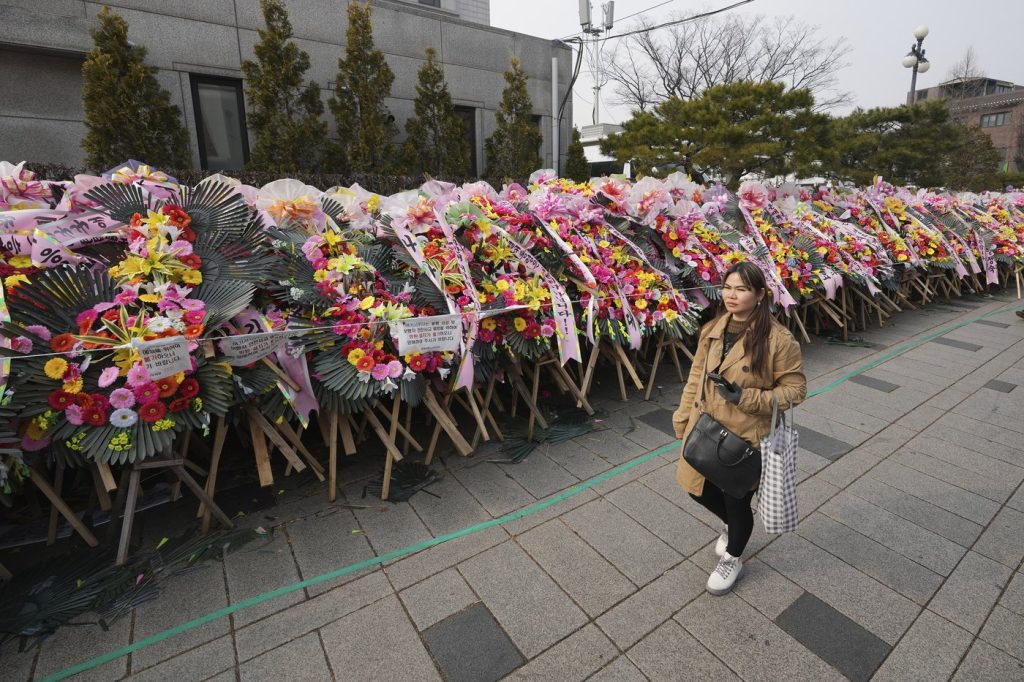SEOUL (AP) – In an unprecedented wave of political dissent, South Koreans are creatively utilizing flower wreaths and K-pop light sticks as protest instruments amid the nation's most profound political turmoil in decades. This crisis ignited in December 2024 when President Yoon Suk Yeol declared martial law, leading to widespread outrage and his subsequent impeachment.
In a striking political statement, hundreds of wreaths, primarily addressed to President Yoon, have been dispatched to his residence and governmental buildings linked to the impeachment proceedings. Local media has estimated that several thousand wreaths were delivered to various government offices, showcasing the fractious sentiments among the populace. While many of the wreaths convey moderate messages either supporting Yoon or opposing the impeachment process, some adopt a more hostile tone. These wreaths range from black-ribboned funeral arrangements adorned with white chrysanthemums to vibrant celebratory wreaths featuring roses and orchids, priced as high as $75, reflecting the increasing polarization of South Korea’s political landscape.
This novel form of protest has gained momentum, evidenced by a fourfold increase in media coverage in 2024 as compared to the previous year. Although the origins of this protest method can be traced back to the early 2010s, experts have not pinpointed its exact inception. Many flower shops claim they have not received significant orders for protest wreaths, while a select few have become prominent figures in this movement. Yoon Miyoung of Dongsung Flower, based in Seoul, reported that she has distributed over 1,000 wreaths since December, mainly for pro-Yoon supporters. She noted that over one-third of her customers are in their 20s and 30s, with orders coming from abroad, including countries like Japan, the United States, and the Netherlands.
Choi Hang-sub, a sociology professor at Kookmin University, remarked on the evolution of the wreath messages, suggesting that while the physical form of the protests remains constant, the messages have morphed into a version of offline hate speech. Profoundly, the wreaths are decorated yet bear sentiments akin to malicious online comments. Professor Kim Hern Sik from Jungwon University described these wreath protests as an "isolated form of demonstration limited to certain political groups," making it challenging to garner broader support from the public. Concerns regarding the environmental impact of wreath protests have also been voiced, as the majority are crafted with cheap, environmentally unfriendly materials, neither benefiting local flower farmers nor the ecological landscape.
Despite the criticisms regarding environmental sustainability, younger generations are finding innovative ways to channel their political expressions. Professor Kim pointed out that K-pop fandom culture, particularly prevalent among young women in their teens and twenties, is increasingly translating into political activism, reflecting a dynamic trend in contemporary protest methods. Last December, outside the National Assembly, thousands brandished K-pop light sticks worth around $50, representing popular bands like BIGBANG, NCT, and Epik High in pro-impeachment demonstrations. Participants, such as 29-year-old protester Hong Gayeong, expressed their commitment to activism by bringing their cherished possessions to these rallies, exemplifying the intertwine of personal significance and political expression.
The political crisis escalated significantly when Yoon enforced military rule on December 3, 2024, by dispatching troops to the National Assembly, culminating in his impeachment just 11 days later. He was arrested on January 19, 2025, during a major law enforcement operation at his residence. Presently, the Constitutional Court has a period of 180 days to determine whether to formally remove him from office or reinstate him, as he faces potential rebellion charges.










